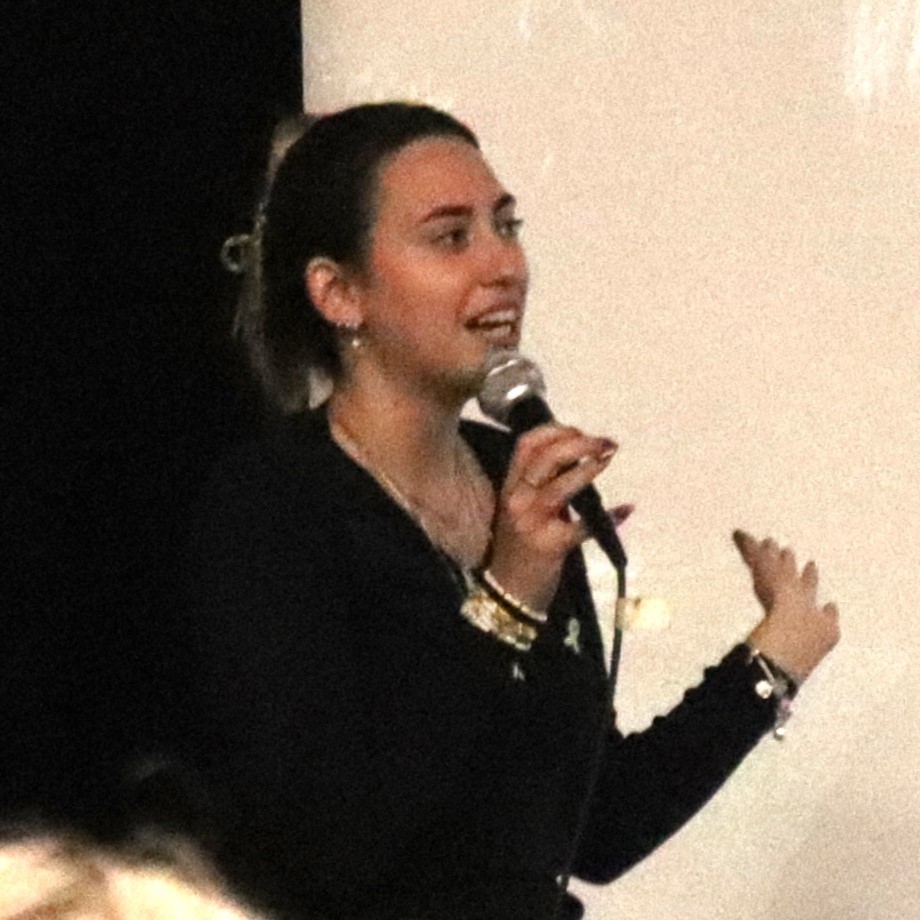On Dec. 1, community members gathered in the social hall at The J to hear from Irene Shavit, an Oct. 7 terror attack survivor from the kibbutz Kfar Aza.
She was speaking as part of Faces of October Seventh, a nonprofit organization aiming to combat antisemitism through speaker events.
The event was organized by Jewish Experiences, a Collaboration of Jewish Federation and The J; Herzl Camp; and Mit-Habrim Connections.
Irene Shavit and her fiancé, Netta Epstein, were asleep in their apartment in Kfar Aza, three miles from the Gaza border, on Oct. 7, 2023. Sirens sounded that morning at 6:30 a.m. Shavit remarked that initially, the sirens did not startle her, as she can remember hearing alarms as early as four years old.
Shavit said that the kibbutz sent a text message telling residents to lock their doors. She told the crowd that it took a while to find the key in the first place, as on her kibbutz, nobody locks the door.
“The door is always open,” she said. “I can go to my neighbor’s house and take sugar, and they are not even home. It’s fine because we have trust, we believe in each other, and we are one big family. If the kibbutz tells us to lock the door, it’s something big.”
At 11:30 a.m., the couple heard Hamas terrorists breaking the windows of their kitchen and living room. Shavit and Epstein were in their bedroom, which serves as a safe room for their apartment.
“We can’t lock the safe room in Israel because it’s meant to save you from rockets, not from human beings... and [the terrorists] know it,” she said. “They manage to open the door, and they throw a grenade into the room.”
The terrorists threw four grenades into the safe room. The first exploded far from where the pair were hiding, the second one injured Shavit’s leg, and the third landed near Shavit.
“When I look up, I can see Netta jumping on the grenade,” Shavit said. “While he jumped, they shot him several times in the stomach, and I could hear him fall down, hitting the grenade, and the grenade exploded.”
Epstein was killed at 11:36 a.m. The fourth grenade started a fire in the safe room. Shavit put a shirt over her nose and mouth and waited until the terrorists left to put it out.
The terrorists later returned to Shavit’s home, shooting Israeli Defense Force soldiers from her living room while she hid under the bed, right around the corner. The IDF rescued Shavit at 4:30 p.m.
Epstein’s family lost eight members, and more than 60 individuals from Kfar Aza were murdered on Oct. 7. Twenty community members were taken hostage, and five are still in Gaza today, more than 420 days later. About 2,500 people attended Epstein’s funeral.
“So many people came because everyone loved Netta,” Shavit said. “Netta was like a butterfly in a human being. He touched every heart. He was so kind to everyone... Every time we would go to the dining room on the kibbutz, with everyone eating together, he would stop every man and woman and child and ask them ‘how are you?’... Netta loves everyone, and I think the most important thing in his life was making sure that everyone knows how important they are. ‘You’re meant to be here, you’re here for a reason, and you should stay.’ That’s why everyone loves Netta.”
Following her remarks, Shavit took questions from the audience. One individual asked what Shavit hopes the audience will take away from her story.
“I think that Jews in the United States suffer from hate more than I do,” she said. “In Israel, we have hate, but we are together in front of one enemy... between ourselves, it’s love. Our fight now is here, not in Israel, because Israel will be fine. I believe it, we are always fine. Here, it’s a different story. It’s my fight as well... The hate here will just grow and grow... It’s our fight now, and I think everyone should fight with us.”
Also speaking at the event was Tommy Hoffman, the executive director of Herzl Camp. Epstein spent four summers at Herzl, starting as a camper in 2014, 2015 and 2016, and in 2018 participating in their staff-in-training program.
“Bearing witness and understanding what is going on in our world empowers us to be proud of who we are and emboldened to go out and defend who we are,” Hoffman said.
Community Shalicha Mika Kislanski was one of the main forces behind bringing Shavit and Faces of October Seventh to Kansas City. Faces of October Seventh also brought Gal Cohen Solal from Kibbutz Reim, Israel, to Kansas City earlier this year. The organization has brought 20 survivors to more than 300 communities across the world.
“In a time when Jewish communities around the world are witnessing immense challenges, it is crucial that we bring voices of resilience and firsthand experience to our community,” Kislanski said. “Irene embodies the strength and courage that define the spirit of the Jewish people. Her presence in our community has allowed us to learn from her journey, honor those who were killed and to stand together in solidarity with Israel.”
Shavit also spoke at the University of Kansas on Dec. 2 at an event co-hosted by KU Hillel, KU Chabad, Jewish Experiences and Herzl Camp.
“We’re grateful for the opportunity to partner with the larger KC community and Herzl Camp to welcome Irene to KU,” KU Hillel Executive Director Ethan Helfand said. “Her story is a deeply personal one for so many of our students, with many of them having known Netta from their time at Herzl Camp. Now, more than ever, we’re honored to host these opportunities for students to build their personal relationships to Israel and ensure that Netta’s memory will always be for a blessing.”



